- Home
- Tracy Chevalier
New Boy Page 2
New Boy Read online
Page 2
The boy shook his head. “I am from Ghana.”
“Oh.” Dee had no idea where Ghana was except that it must be in Africa. He still seemed friendly, but the expression had frozen onto his face and was becoming less sincere. Dee was determined to demonstrate that she did know something about African culture. She nodded at the woman by the fence. “Is your mom wearing a dashiki?” She knew the word because for Christmas her hippie aunt had given her pants with a dashiki pattern on them. To please her, Dee had worn them at Christmas dinner, and had to endure frowns from her mother and teasing from her older brother about wearing a tablecloth when they already had one on the table. Afterward she had shoved the pants to the back of her closet and not touched them since.
“Dashikis are shirts that African men wear,” the boy said. He could have been scornful or made fun of her, but instead he was matter-of-fact. “Or black Americans sometimes when they want to make a point.”
Dee nodded, though she wondered what that point was. “I think the Jackson Five wore them on Soul Train.”
The boy smiled. “I was thinking of Malcolm X—he wore a dashiki once.” Now it seemed he was teasing her a little. Dee found she didn’t mind if it meant the stiff, frozen look disappeared.
“My mother is wearing a dress made from kente cloth,” he continued. “It is fabric from my country.”
“Why is she wearing a winter coat?”
“Unless we are in Ghana, she feels the cold even when it is warm outside.”
“Are you cold too?”
“No, I am not cold.” The boy answered in full, formal sentences, the way Dee and her classmates did during French lessons once a week. His accent wasn’t American, though it contained some American phrases. There was a hint of English in it. Dee’s mother liked to watch Upstairs, Downstairs on TV; he sounded a bit like that, though not as clipped and expensive, and with more of a singsong cadence that must come from Africa. His full sentences and lack of contractions, the lilt in his speech, the rich exaggeration of his vowels, all made Dee want to smile, but she didn’t want to be impolite.
“Is she going to pick you up after school too?” she asked. Her own mother never came to school except for parent–teacher meetings. She didn’t like to leave the house.
The boy smiled again. “I have made her promise not to come. I know the way home.”
Dee smiled back. “Probably better. Only the kids on the younger playground have their parents bring them to school and pick them up.”
The second bell rang. The fourth grade teachers turned and led their lines of children through the entrance from the playground into school. Then fifth graders would go, and finally the sixth grade classes.
“Would you like me to carry the ropes for you?” the boy asked.
“Oh! No, thanks—they’re not heavy.” They were kind of heavy. No boy had ever offered to carry them for her.
“Please.” The boy held out his arms and she handed them to him.
“What’s your name?” she asked as their line began to move.
“Osei.”
“O…” The name was so foreign that Dee could not find a hook in it to hang on to. It was like trying to climb a smooth boulder.
He smiled at her confusion, clearly used to it. “It is easier to call me O,” he said, bringing his name into the familiar arena of letters. “I don’t mind. Even my sister calls me O sometimes.”
“No, I can say it. O-say-ee. Is it in your language?”
“Yes. It means ‘noble.’ What is your name, please?”
“Dee. Short for Daniela, but everybody calls me Dee.”
“Dee? Like the letter D?”
She nodded. They looked at each other, and this simple link of letters standing in for their names made them burst out laughing. O had beautiful straight teeth, a flash of light in his dark face that sparked something inside her.
Ian spotted the boy immediately, even while busy spinning the merry-go-round too fast and making the fourth graders scream. Ian would always notice anyone new who stepped into his territory. For the playground was his. It had been all year, since he had started sixth grade and there were no older boys to rule it. He’d had months to relish this domination. Any new boy posed a challenge. And this new boy, well…
Ian was not the tallest boy in the year, nor the fastest. He did not kick balls the farthest, or jump the highest when shooting baskets, or do the most chin-ups on the monkey bars. He did not speak much in class, never had gold stars pasted to his artwork, did not win certificates at the end of the year for best mathematician or best handwriting or best citizenship. Definitely not best citizenship. He was not the most popular with the girls—Casper claimed that honor.
Ian was the shrewdest. The most calculating. The quickest to respond to a new situation and turn it to his advantage. When a fight was brewing, Ian would take bets on the outcome and make sure the participants didn’t chicken out. He was good at predicting who would win. Sometimes he’d bet on how long the fight would last and which teacher would break it up. He often took the stakes in candy, which he sold afterward—he did not have a sweet tooth. Sometimes he demanded others’ lunch money, but other times he protected younger students from having theirs stolen, and took a cut himself. He liked to mix things up, keep kids guessing. Recently he had convinced his parents to let him open a bank account. They did not ask him how he had amassed so much money. His brothers had been the same at his age.
When his class went running around the block during PE, Ian offered to go back and collect the slower children; it gave him a chance to study what was going on out in the world during the day—who was delivering mail, who was washing their car, who was leaving their door open while they pruned their roses. Ian was always looking for the angle that would benefit him.
He did not always get it right.
A few days before, for instance, a storm had arrived out of nowhere. Ian had raised his hand while Miss Lode was trying to explain what an isosceles triangle was. She had chalk dust all over her orange pantsuit and wore a perplexed expression, as if geometry were just out of her reach too. She’d stopped, taken aback, for Ian rarely raised his hand. “Yes, Ian?”
“Miss Lode, it’s starting to rain and the flag is still up. May I go take it down?”
Miss Lode glanced out the window at the amassed dark clouds and the American flag that flew all day in front of the school. “The girls in Mr. Brabant’s class are responsible for it. You know that.”
“They’re never fast enough, though. And Mr. Brabant isn’t here today to remind them. If I run now, it won’t get wet.”
Miss Lode hesitated, then nodded at the door. “All right, then—be quick. And take someone with you to fold it.”
There were lots of rules about the American flag: it should never be flown at night or in the rain, it should never touch the ground, it should be treated with reverence. Ian had watched enviously from the window as Dee and Blanca went to the flagpole at the beginning and end of each day, ostentatious in their privilege. Usually they worked carefully, but he had also seen them fold the flag sloppily and let a corner touch the ground. He had heard them sing songs—sometimes patriotic, but often songs from the radio. They liked to take their time, talk, dawdle, laugh.
He chose Mimi to come with him, to everyone’s surprise—Miss Lode, Rod and most of the other boys, and all of the girls, who giggled behind their hands. Mimi herself looked not only amazed, but thrilled, and fearful. Until fifth grade, boys and girls had sometimes played together and declared themselves friends. But for the last two years of school, they’d separated and stayed with their own gender—unless they spent furtive moments together out of sight of the teachers, behind the gym or in the corner among the trees that provided the little shade on a sunny day. Last week Ian had draped his arm around Mimi, back behind the gym, letting his hand dangle down over her high budding breasts, but he’d been interrupted from doing more by Rod offering to drop his jeans and underwear and show what he had to the girls.
Mimi had squealed along with the others and moved out from under Ian’s arm—reluctantly, he sensed.
As she followed him outside to the flagpole, it was spitting with rain, though the worst of it was still up in the clouds. Ian was careful not to pay her too much attention, instead focusing on unwinding the rope from the bracket screwed onto the pole at waist height. Then he lowered the flag. “Catch the end,” he commanded.
Mimi obeyed, grabbing the two corners as they came down. Ian unclipped the other two corners from the rope, then they held the flag taut between them like a sheet. Ian looked at her for a second longer than he needed to, and she stood very still, her eyes wide. They were a crystal blue swimming with dark flecks, which made them sparkle in a way that disconcerted him. She had the classic freckled skin of a redhead—Irish, probably—and a wide mouth with lips that didn’t cover the braces glinting across her teeth. Her features were too irregular—her eyes too far apart, her mouth too big, her forehead broad—for her to be thought of as pretty. Nonetheless, there was something compelling about Mimi. This was their seventh year together at the same school. Ian had knocked her over once in third grade, because he could, but he had not paid much attention to her until recently. He had chosen Mimi for his focus because she was like him—a step apart from everyone else on the playground. Despite having an older and younger sister who both appeared normal, and popular Dee as her best friend, Mimi often seemed to be alone in her head, even when she was turning jump ropes or playing hopscotch. She had the reputation of being a bit out of it, of fainting at the wrong times, of saying little but watching everything. Maybe that was what appealed: he didn’t want her to talk much.
He jiggled his right hand to indicate they should fold the long edge a third over; then they folded the other side on top so that the flag was a third of its width. Ian looked at Mimi too long again and she blushed. “You fold,” he said. “You know how?”
Mimi nodded, and folded her end on a diagonal so that it made a triangle, then folded it again and again, getting closer with each fold. Ian held the end close to his chest so that she had to come right up to him. When she was about a foot away, ready to make the last fold, Ian tugged the flag so that she fell into him, the triangle squashed between them as he lunged for her mouth. Their teeth clattered together, and Mimi flinched, but she couldn’t step back or the flag would fall to the ground.
Her braces hurt his mouth, but Ian recovered and, placing his lips firmly on hers, began to suck. After a moment Mimi responded, sucking back so that they created a vacuum and a lot of spit, though she kept her mouth too tight for him to insert his tongue. She’s done this before, Ian realized—a thought he did not like much. He pulled away, though he had been enjoying himself and had begun to feel something, which he suspected she’d noticed. Taking the flag from her, he made the last fold and tucked the leftover cloth into two folds so that it held tight together, like the paper triangles kids made to flick across the table surface for table football. “You shouldn’t be doing that with others,” he said.
Mimi looked a little dazed, even frightened. “I haven’t.”
“You’re not a very good liar. You’ve kissed other boys—Philip, Charlie, Duncan, even Casper.” Ian was making intelligent guesses, and at least one struck home, though he didn’t know which. Mimi hung her head; it was starting to rain harder, spotting her face so that it looked as if she were crying.
“If you’re gonna go with me, you better not even look at those boys. Will you go with me?”
Mimi nodded.
“Then open your mouth when we kiss so I can stick my tongue in.”
“The girls will be coming from Mr. Brabant’s class—they’ll see us.”
“Nah. I’ve watched—they take forever to get out here. The flag always gets wet and Dee has to take it home to put it in the dryer. Come on.”
He put his mouth back on hers. When she opened up, Ian thrust his tongue deep into her, backing her up against the flagpole so he could probe her teeth, her cheeks, her tongue, pumping in and out. He pushed his hips into hers to make sure that this time she definitely felt him.
When they pulled apart, they were both breathless. Kissing her made him feel light-headed and, for once, free. The rope was dangling in the rain. Ian took hold of it, glanced around, then handed the flag triangle to Mimi. “Stand back. I’m gonna show you something.” Wrapping the end of the rope around his hand, he began to run, leaning out from the flagpole so that the rope was taut. Then he leaped, and swooped off the ground and out around the pole, then back in. He ran onto the ground again and then out and up—going around and around the pole. The rain fell away, Mimi, the school; all he felt was the sensation of flying.
When he lost momentum and came back down, Mimi was watching him, the flag hugged against her chest. Ian felt so good he decided to be generous. “Do you want to? Go on, it’s fun.” He took the flag back and handed her the rope. “Run fast, then jump.”
She hesitated. “Mrs. Duke might see me. Or the teachers. We’ll get caught.”
Ian snorted. “No one’s watching. They’re too busy learning about triangles. Don’t you want to?”
Mimi seemed to reach a decision, and suddenly ran and flung herself into the air, leaning away from the pole to swing around it, laughing as her feet left the ground. Ian had never seen her happier. He smiled, a quick, rare thing. When she stopped he kissed her again, this time more gently. They pulled apart just as Dee and Blanca appeared in the school entrance, to take down the flag. Dee gave them a funny look, clearly surprised to see them together, though Ian wasn’t sure she had seen the kiss. It didn’t matter. “You girls are way too slow,” he declared, sauntering past them with the folded flag tucked under his arm. Mimi followed, her face bright red.
Unfortunately Ian had been too slow as well, for the flag was wet, which he had gone out to make sure didn’t happen. Miss Lode squeezed the cloth triangle he left on her desk and frowned.
“Is that an isosceles triangle, Miss Lode?” he asked, hoping to divert her.
“Oh!” His teacher squinted at the flag. “I don’t know. But that’s—Jennifer, take it to Mr. Brabant’s class.”
“I can look after it,” Ian interjected. “I can put it back up when the rain stops, and take it down at the end of the day.”
“I would rather the responsibility remain with Mr. Brabant’s class. Now, go and sit down, Ian. That’s enough disruption for today.”
Ian kicked himself for taking the time to swing on the rope. That sensation had cost him his opportunity to gain another privilege—though he suspected that Miss Lode would always have deferred to Mr. Brabant.
—
The first bell rang on the playground and Ian grabbed at the bars of the merry-go-round to slow it. One of the boys riding was looking sick. Ian smirked and tugged a bar to speed it up again. “Ten cents to stop it,” he called to the boy, who nodded miserably. Ian dug his feet in so that the merry-go-round came to a sudden halt. The other boys ran off toward the class lines forming at the door, relieved not to be the focus of Ian’s attention this time. The unfortunate boy left behind stood still, shoulders rounded, head down.
“You pay me now,” Ian said.
The boy shrugged, eyes fastened to the ground. “Don’t have any money.”
“You should’ve thought of that when you were on the merry-go-round.” Ian stepped close to him. “Get back on. I’ll spin you till you’re sick.”
“I—I’ll pay you tomorrow. Promise.”
“Tomorrow’s no good. Now is better. What else do you have? You got any candy?”
The boy shook his head.
“Baseball cards?”
Another shake.
“Well, what do you have?”
Another shrug.
Ian riffled through the knowledge he had absorbed by watching and noting all that went on around him. “Give me the Hot Wheels you’ve got—the red Camaro.”
He struck home, for the boy began to search his pockets. “I
’ve got a nickel. I can give you that now, and the rest tomorrow—or after lunch. I can go home at lunchtime and get five more cents.”
But Ian was already reaching for the canvas book bag the boy had flung next to the fence a few innocent minutes before, back when riding a merry-go-round seemed like something fun to do before school. Ian extracted a low red sports car with fat wheels that fit perfectly in the palm of his hand. It was still gleaming: clearly a recent acquisition. As he pocketed the car, he heard the boy mutter, “Chump.”
Ian took the car back out of his pocket and let it drop, then stamped on it. The wheels snapped off, the doors popped open, the roof caved partway in, and red paint flaked off the hood. “Oops,” Ian said, and left it there. A moment later he chided himself for letting his anger get the better of him and wasting a good Hot Wheels, when he had been called far worse things before than “chump.” But it was satisfying to see the expression on the boy’s face, looking even sicker than he had on the merry-go-round.
During this whole exchange Ian had kept an eye on the new arrival hovering at the edge of the playground. Now he changed direction and headed over to the new boy. To the black boy. For he was very black. Ian had picked up the information during one of his fact-finding missions that a new boy was joining the sixth grade, but he’d missed the crucial bit about his skin color. He winced inwardly as he got close and took in the dark skin, the black eyes, the sweat glistening in the hair cut close to his skull. Take charge, he thought. Keep your friends close, your enemies closer. His father liked to quote that. “You have to line up when the bell rings,” he said. “Over there. You’re in Mr. Brabant’s class.”
The boy nodded. “Thank you.” Just those two words and the way he said it—straightforward, confident even, with his foreign intonation—and his subsequent walk over to the line as if he already knew the playground, and owned it, struck a match of fury in Ian’s gut.
“Damn.” Rod had sidled up like an uncertain dog. Small and wiry, he had dark shaggy hair to his shoulders and cheeks that reddened easily when he was upset. They were red now. “What the hell has happened to this shithole?” Ian’s sidekick swore a lot around him, clearly thinking it made him sound tough. Ian himself never swore. His father had taken his belt to him early on to make clear that swearing was his domain, not his son’s.

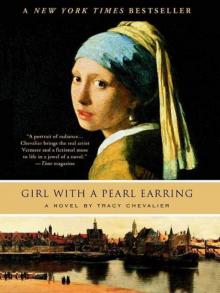 Girl With a Pearl Earring
Girl With a Pearl Earring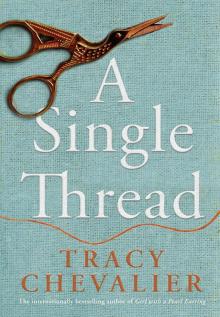 A Single Thread
A Single Thread Reader, I Married Him: Stories Inspired by Jane Eyre
Reader, I Married Him: Stories Inspired by Jane Eyre The Last Runaway
The Last Runaway Burning Bright
Burning Bright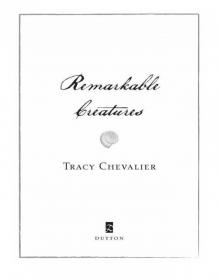 Remarkable Creatures
Remarkable Creatures At the Edge of the Orchard
At the Edge of the Orchard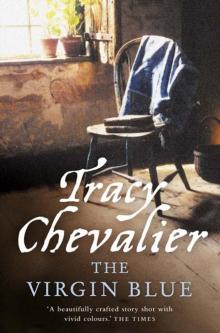 The Virgin Blue
The Virgin Blue The Lady and the Unicorn
The Lady and the Unicorn Falling Angels
Falling Angels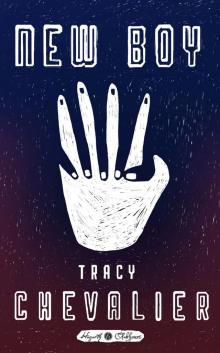 New Boy
New Boy Reader, I Married Him
Reader, I Married Him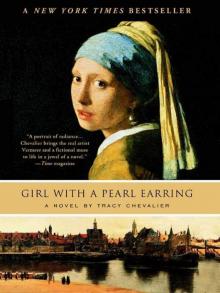 Girl with a Pearl Earring, The
Girl with a Pearl Earring, The